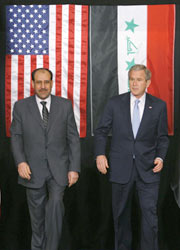
Lebanese PM, Fouad Siniora, addressed the Lebanese people today on national television. Siniora spoke against the Hezbollah led Lebanese opposition who is planning to hold mass demonstrations tomorrow in Beirut. Hezbollah demands the immediate establishment of a national unity government and threatens to topple Siniora's duly elected one. Siniora expressed concern for Lebanon and its democracy and called on the public to support the goverment. Siniora went on to state that the government will only be brought down by political means and not by threats or ultimatums.




